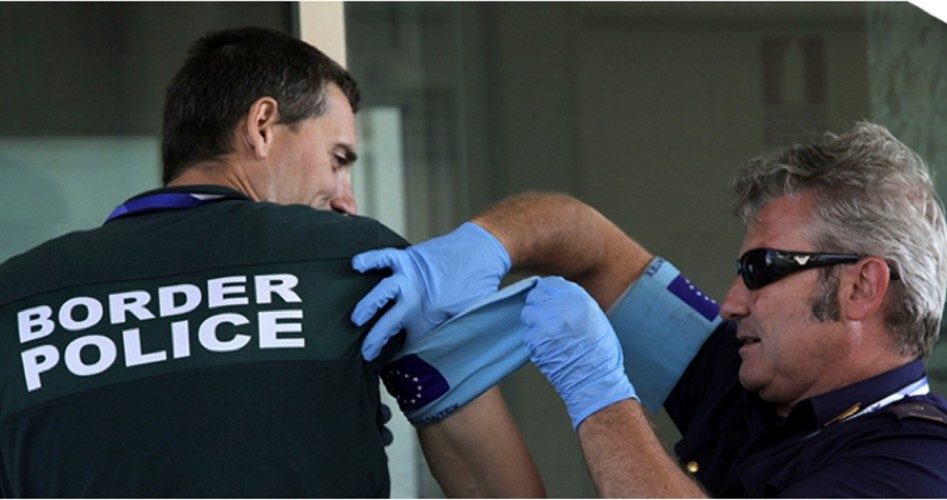
A report issued on April 5 by Frontex — the EU’s agency for the “Management of Operational Cooperation at the [EU’s] External Borders” — advised that EU member states reported 1.82 million illegal border crossings, a number that was more than six times the previous record set in 2014. The report (called its “Annual Risk Analysis”) concluded that “an increasing terrorist threat” was among three major challenges facing the EU at its external borders.
The other challenges listed are “an unprecedented rise in migratory pressure” and “a steady rise in the number of regular travelers.”
Frontex explained why the number of illegal border crossings was actually higher than the total number of migrants arriving in Europe last year, which were estimated at approximately one million:
A large number of illegal crossings were made by people who were counted for the first time when arriving on the Greek islands from Turkey and later were counted again when crossing one of EU’s external borders in the Western Balkans.
The fact that almost one million migrants who migrated to Greece illegally were not deported but allowed to travel on to cross other EU borders indicates that the EU has done no better than the United States in enforcing its borders. Chris Cabrera, vice president of the National Border Patrol Council Local 3307 in the Rio Grande Valley, complained to Fox News in 2014:
Our agents aren’t allowed to do the job they were hired to do. We’re walking more and more people out the door.… They’re catch-and-release that have family units. The criminal aliens that are coming in, some of these young gang member kids that are coming in, and there’s no criminal history in the United States, we’re releasing them out the door and more and more it gets frustrating.
On March 18, Frontex Executive Director Fabrice Leggeri called on EU member states to come forward with additional police officers and readmission experts to support Greece in returning migrants to Turkey.
Britain’s Telegraph newspaper noted in an April 5 report that Frontex has warned that a “staggering number” of EU citizens have traveled to Syria to fight with ISIS and that they are now posing as refugees to gain entry to Europe.
The Telegraph quoted a Frontex statement: “The Paris attacks in November 2015 clearly demonstrated that irregular migratory flows could be used by terrorists to enter the EU.”
The article went on to note that two of the Islamists involved in the Paris attacks had entered the EU through the Greek island of Leros and had been registered by the Greek authorities after presenting fraudulent Syrian documents.
A joint report from CBS and the AP in March stated that raids carried out by Belgian authorities to detect and apprehend members of the terrorist organization responsible for the bombings that killed 34 people in Brussels on March 22 uncovered a Europe-wide jihadist cell that was connected not only to the attacks in Belgium, but also to those killing 130 people in Paris in November.
We reported in a March 24 article that Salah Abdeslam — the leading suspect in the Paris bombings — had been recruited into the terrorist network headed by Abdelhamid Abaaoud, the individual that French and Belgian officials suspected was the mastermind of the Paris attacks. Abaaoud was killed in a police raid in a Paris suburb on November 18.
The two men were childhood friends while growing up in Brussels and were both of Moroccan descent. After Abaaoud returned to Brussels following a period of terrorist activity in Syria in 2014, he recruited Abdeslam into his terrorist network, and both men conspired to carry out the Paris attacks.
Abdeslam fled Paris immediately after the November attacks, and moved back to the Molenbeek neighborhood of Brussels where he and Abaaoud had grown up. An AP report at the time cited Belgian officials who said that the neighborhood has long been known as a haven for jihadis. At least three of the terrorists who plotted the Paris attacks, including Brahim Abdeslam (Salah’s brother), and Abaaoud grew up and lived in Molenbeek.
The ability of terrorists such as Abdeslam and Abaaoud to travel freely across the EU’s borders to Syria, where they can confer with ISIL leaders, and then back to Europe to perpetrate terrorist attacks, indicates how poorly the EU has enforced its external borders. It also demonstrates how easily terrorists can hide among the massive wave of refugees who have entered Europe over the last year of so.
We reported in another article on March 25 (citing a March 23 Associated Press report) that ISIS has trained an estimated 400 fighters and sent them to Europe to carry out attacks such as the ones in Paris on November 13 and Brussels on March 22.
These findings should also make U.S. officials wary of allowing refugees to enter America from areas of the Middle East where terrorism is rampant, at least until a more reliable vetting process can be developed. This point has not been ignored by many U.S. governors, as we noted in an article last November.
On November 16, five governors joined Michigan’s Rick Snyder and Alabama’s Robert Bentley in issuing policy statements that opposed allowing refugees from Syria to settle in their states. Greg Abbott of Texas, the governor of the nation’s second largest state in both area and population, sent an open letter to President Obama that stated, in part: “As governor of Texas, I write to inform you that the State of Texas will not accept any refugees from Syria in the wake of the deadly terrorist attack in Paris.”
Subsequent events, including the terrorist attack in Brussels, and the report that ISIS has trained 400 fighters and sent them to Europe, have confirmed the wisdom of Abbott’s position. If ISIS can successfully complete terrorist attacks in Europe, it is also capable of carrying out such attacks in the United States.
Related articles:
Raids Reveal “Europe-wide” Jihadist Cell
ISIS Has Trained 400 Fighters to Attack Europe
Anti-immigration AfD Party Makes Gains in German State Elections
Hungarian PM: Mass Migration a Plot to Destroy Christian West
ISIS Has Trained 400 Fighters to Attack Europe
Brussels Terror Attacks Underscore Insanity of EU Migration Policy
Germany Does Not Know Where 130,000 Asylum Seekers Are
German Intelligence Says ISIS Fighters Are Among Refugees
Refugee Crisis Has Europe on the Brink, Establishment Admits
Anti-immigration AfD Party Makes Gains in German State Elections
U.S. European Commander: Risk of Terrorists Recruiting Refugees in Europe
After Migrant Numbers Reach Record Highs, EU Summit Aims to Stem Flow
Anti-ISIS Coalition Built ISIS (Video)
German Cabinet Official Warns Europe Can Expect 10 Million More Migrants
German Newspaper: Officials Are Covering Up Crimes by Migrants
Czech President Calls Influx of Refugees to Europe an “Organized Invasion”
European Parliament President Says “Christians Are Not Safe” in Europe
Hungary’s Orban Says Germany Made “Secret Pact” with Turkey to Accept Refugees
French President: Refugees Still Welcome, Despite Paris Attack
Refugee Crisis Prompts Sweden to Introduce Border Controls
In Response to Massive Influx of Refugees, Europeans Seek More Guns
EU Leaders Will Spread 120,000 Refugees Across Europe
Germany Changes Policy and Halts Massive Influx of Middle Eastern Refugees
Flood of Refugees From Syrian Civil War Challenges Europe
European Commission President Asks EU to Accept 160,000 Migrants


